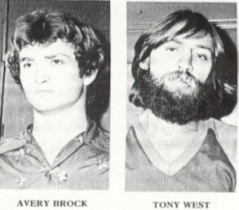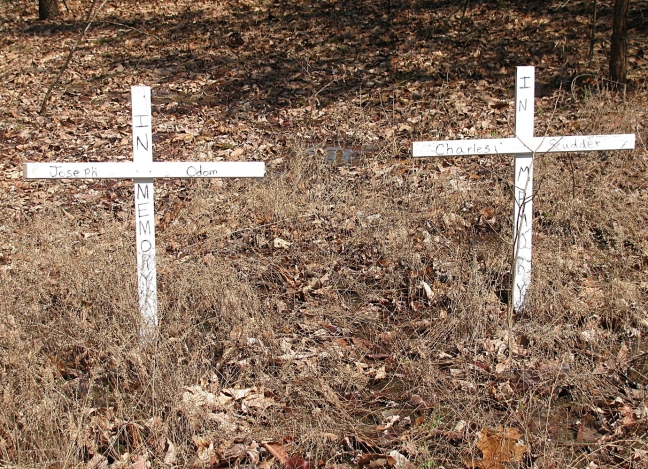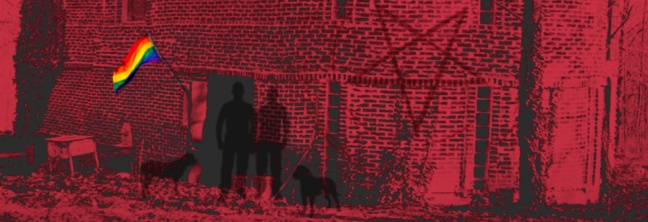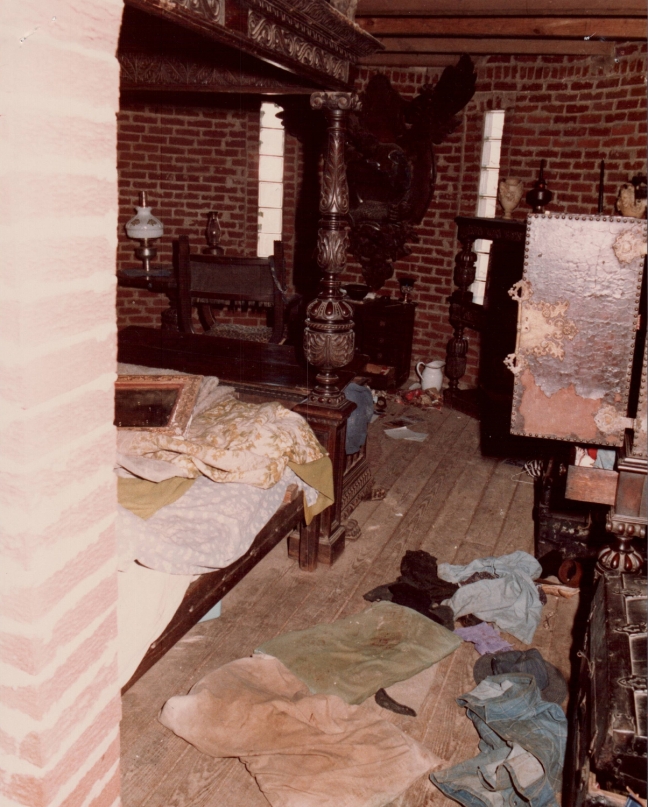[An earlier version of this article was originally written for Week in Weird]
Being openly gay in certain parts of the rural United States often has been considered more dangerous than in urban environments.* And for two men who relocated from Chicago to rural Georgia, this was proven true one night in 1982. While nature has reclaimed all but a few traces of this horrific crime scene on Taylor Ridge, the exact events surrounding the deaths of Charles Scudder and Joseph Odom are still a topic of fiery debate and contention around Summerville, Georgia.
Of all the stories I’ve blogged and written about during the past decade, Corpsewood has stood out as one of the most controversial of all. There are those who still believe the convicted murderers should have been found innocent and are the true victims in this bloody tale. Rumors of satanic worship, drug use, and rape have muddied the crime and made the murder victims seem less like your average gay couple and more like demonic, inhuman beings preying on straight men. The site is considered extremely haunted by many locals and strange tales of cursed bricks and dark shadows have been told by those brave enough to wander deep into the woods, more likely risking harm from the living far more than from the dead.
The Corpsewood murders were the subject of a chapter in my last book, Queer Hauntings; in fact, it was the first chapter I ever wrote. On the night that I finished writing the first chapter draft, I’m not ashamed to admit that I slept with a light on. The combination of a gruesome murder scene and a creepy, isolated, haunted building ruin chilled me to the core. I don’t know how much of it was my imagination having spent weeks immersed in the detailed news articles of the incident, but I never felt alone while writing the chapter. Needless to say, I didn’t sleep well that night.
To better understand the whole story of Corpsewood, it’s important to know not only what happened that fateful night but who Charles Scudder and Joseph Odom were.
Charles Scudder was a professor of pharmacology at Loyola University in Chicago, a widowed father to four boys. He lived with his two dogs and a “quiet feminine” man named Joseph Odom. A fifth-grade dropout having spent several years on the wrong side of the law, Odom served as a housekeeper and “companion” for Scudder. By all accounts, Odom was more than just an employee of Scudder: the two men shared a bed.
As university politics became unbearable, Scudder felt the need to escape the chaotic, busy city life. He found 40 acres of woodland in northern Georgia for sale—miles away from the nearest neighbors—and after seeing it in person for the first time, he bought it immediately. On his 50th birthday, he resigned from his faculty position, sold off nearly everything he owned, and drove off with Odom in their black Jeep to begin a new, more peaceful life in the Appalachians. Living their first winter out of a camper parked on the property, these men chose to build a brick mansion by hand, just the two of them. The endless stand of barren trees around them that first winter inspired the name for their new home: Corpsewood.
Scudder and Odom lived simply in their two-story home, telling of his experience in an article for Mother Earth News in the spring of 1981. A wood stove provided heat, a chemical toilet served as an outhouse, and they grew their own food. Behind the house was a small vineyard for making homemade wine. Scudder was fascinated by religions and the occult and adorned the interior with all manner of strange ornaments and antiques. In front, a pink-painted concrete gargoyle overlooked a rose garden tended to by Odom. Beside the house was a three-story chicken house, the top floor of which was nicknamed the “Pink Room” and served as a recreation room for socializing with guests.
In the winter of 1982, everything changed. What follows is a detailed chain of events, pieced together through meticulous research into newspaper archives and testimonies of the time, telling the unraveling of what happened at Corpsewood Manor:
“In November of 1982, Kenneth Avery Brock moved into the Halls Valley trailer of a 30-year-old unemployed construction worker by the name of Samuel Tony West. The 17-year-old part-time truck driver told West the tale of “queer devil-worshipers” living in the isolated country. Brock first met the couple while hunting deer on their property. He befriended them and spent many occasions drinking their homemade wine. Their relationship soon escalated; Brock may have become intimately involved with the men on numerous occasions (others speculate that Brock attempted to initiate a threesome with the couple but was denied). Scudder and Odom’s relaxed demeanor and effortless existence gave Brock the false impression that Scudder and Odom stockpiled an immense fortune. The vivid mind of 17-year-old Brock convinced Tony West they could become wealthy beyond their wildest dreams.
In a small town where rumors and gossip became gospel, Brock and West fell under the spell: blinded by greed. Disillusioned by their downtrodden lives, the duo hatched a plot to rob the couple of their fortune and run away, free to live their lives as they had always dreamed. After hatching the burglary plan with West, Brock’s visits took on new meaning. In November of 1982, he visited the “castle in the woods” several times in an attempt to study the layout of the house. Unfortunately, his sexual encounters with Scudder and Odom were limited to the Pink Room and he was never granted entry into Corpsewood Manor.
On the evening of December 12, 1982, the plan was set into motion. Brock made a stop at his mother’s trailer to pick up a .22 caliber Remington automatic rifle “to use rabbit hunting”. The duo stopped to visit Joey Wells and offered to take him and his date, Teresa Hudgins, out joyriding. West and Brock suggested a visit to Corpsewood to drink some of their wine. While Joey was thrilled with the notion of free alcohol, Teresa was hesitant to meet the “devil-worshipers”. Convinced by the others that it would be fun, she finally relented. The four individuals slowly traveled through the hilly roads of Taylor Ridge, huffing a combination of paint thinner, alcohol, and glue called toot-a-loo. Teresa peered down at the rifle tucked between the front seats.
Charles greeted his unannounced visitors and bummed a cigarette for Odom, who was in the kitchen cleaning up after supper. Their visitors climbed the 40-foot ladder to the Pink Room, accompanied by Scudder. Wine was passed and the gathering became merry. Shortly thereafter, Brock stepped out to his car to get more toot-a-loo. He reappeared with his rifle minutes later, returning to his seat on the mattress.
Charles Scudder stifled a giggle. “Bang, bang,” he uttered, amused in his mild intoxication.
When Scudder stood to adjust a lantern, Brock leapt into action. He grabbed the former professor by the hair, slid a knife from out of his military boot, and pressed it against Scudder’s throat. Brock demanded money and tossed the professor onto the mattress. He cut strips of pin cloth from the sheets and bound Scudder in his heavy coat. West and Hudgins were terrified and ran to the car, but the engine refused to start. As they headed back to the Pink Room, they could hear Brock’s desperate, angry demands.
West stood up and handed Brock the rifle. Odom was interrupted in the kitchen by Brock ordering him out of the house. He looked up toward the doorway as Brock fired four rounds into Odom. Several more finished off the mastiffs, which never moved from their comfortable spot beside the wood stove.
Brock returned to the Pink Room and lead Scudder back to the house. The professor was ushered into the house where the gruesome scene met his eyes. As he stood over the bodies of his deceased lover and beloved mastiffs, a muffled moan escaped from beneath his gag. He knew the end was near.
Brock led him into the library, pulled down the pink gag in Scudder’s mouth, and sat him in a chair. Charles stood one final time and shuffled in his bound feet toward Odom’s body. West demanded that he stop. As he continued his slow movement, intently gazing at Odom’s corpse, Charles Scudder uttered his final words.
“I asked for this.”
West shot Scudder in the face at close range. Falling to his knees, Charles attempted to speak and stand. West fired again, sending the professor reeling backward into the bookcase. Scudder gurgled out unintelligible sounds as West fired three more shots into Scudder’s head.
West and Brock ransacked the house searching for the hidden fortune. They left with only a handful of dimes and nickels, bits of jewelry, silver candelabras, and a gold-plated dagger. The gold harp was too large to take with them. Less than two hours after arriving, the visitors left, splitting up between West’s red 1970 AMC Javelin and Scudder’s black CJ-5 Jeep with white pentacles painted on the doors.
Raymond Williams visited Corpsewood two days later to notify the couple of the passing of a friend in Rome, Georgia. He noticed bullet holes in the green kitchen door and called the police. West and Brock fled, but each was apprehended without incident.
During West’s confession to Chattooga County Sheriff Tony Gilleland, the suspect stated, “All I can say is they were devils and I killed them, that’s how I feel about it.”
As the trial went underway, Scudder and Odom were labeled “homosexual devil-worshipers”. Being reclusive made the victims easy targets for bigotry and hatred. Scudder had joined the Church of Satan “to see what it was like”, according to his friend Raymond Williams. While inverted pentagrams are a common symbol in satanic imagery, the religion itself does not idolize Satan. LaVeyan (or symbolic) Satanism, as practiced by the Church of Satan, does not worship a deity; they worship the self. The devil is used as a symbol of humankind’s inner desires and is closely related to atheism. While the victims did possess some occult items and satanic artifacts, their religious beliefs did not affect their character.
Defense attorneys argued that the two murderers were given wine laced with LSD by Scudder, yet no evidence supported these claims. While on staff at the Strich School of Medicine at Loyola, the victim had been the Assistant Director of the Institute for the Study of Mind, Drugs and Behavior. Three vials of LSD-25 were found in a cigar box in Scudder’s desk. The defense attempted to prove that the murderers had been drugged and were temporarily insane at the time of the crimes, yet no trace of hallucinogenic drugs was found in the wine at the scene.”
 While in jail, Brock attempted suicide. At trial, he was found guilty on all counts and sentenced to three consecutive life terms. He is currently serving his sentence in Georgia State Prison. Samuel T. West was convicted of double homicide and sentenced to die in the electric chair. The death sentence was repealed and he is currently serving out his life sentence at Augusta State Medical Prison.
While in jail, Brock attempted suicide. At trial, he was found guilty on all counts and sentenced to three consecutive life terms. He is currently serving his sentence in Georgia State Prison. Samuel T. West was convicted of double homicide and sentenced to die in the electric chair. The death sentence was repealed and he is currently serving out his life sentence at Augusta State Medical Prison.
There was a small private funeral ceremony held at Corpsewood. Odom’s ashes were scattered in his rose garden. Scudder’s body was sent home to Milwaukee at the request of his sister.

Even during the police investigation, officers reported a feeling of being watched and a strange presence at Corpsewood. People who took souvenirs from the crime and house home with them reported bad luck and felt the objects were cursed. Even today, people visiting the site report shadows and apparitions believed to be Odom and Scudder. Gunshots, barking dogs, and shattering glass—as well as haunting melodies played on Scudder’s golden harp—have been heard there. After nightfall, some witnesses have claimed to see the glowing eyes of Beelzebub, one of Scudder’s mastiffs, staring at them from the woods.
But far more terrifying than any ghostly reports are the events which played out at Corpsewood that winter night. Charles Scudder was an inactive member of the Anton LaVey’s Church of Satan. In the wake of the murders, LaVey was angered by what happened to Scudder and Odom and the “injustice of what happened to them.” He viewed the double homicide as proof that there were still parts of the United States where eccentric individuals could be attacked for having what some people might view as abnormal beliefs.
And what did Scudder mean by his final words, “I asked for this”? Were they implying his befriending the wrong people and inviting them into his home or alluding to moving to an intolerant area with his partner? Or was it much deeper than that?
Months before the incident, Charles Scudder painted a self-portrait that implies he may have had a premonition of his own death.
In the painting, Scudder was gagged and had five bullet wounds.
*Though statistical data from the DOJ suggests otherwise, fewer agencies for reporting hate crimes are found in rural areas.




“I asked for this”??? Who says this was the last thing he said? His murderer? Ha! Sure, pull the other leg, it’s gone completely dead sitting here, now it might come right off. Dude was a retired intellectual an atheist, thinking maybe now, he could finally live life just as he wanted and not care about putting it in the faces of people who disagreed with him for their own ridiculousness. He was living life the freest he could, trolling the ones who lived in fear – having nothing to fear, except fear itself – and enter fear itself, in the form of a couple of sheltered bible-belt-raised small-town Southern Christian kids on the verge of manhood, harboring fear and judgment and probably beating themselves up for every little “sin” they committed in expressing their own sexuality or drinking or doing anything else.
He was primed to want to escape the town and it’s restraints, he was not equipped to accept himself (it’s the Christian South where all real vulnerability in men is punished and must be justified or vindicated – cleansed by vengeance, fire and brimstone). He thinks these guys have everything he wants but can’t really attain: freedom and money. He can justify what he does so easily, all he has to do is blame them “the devil made me do it”, after all, the resentment is already building, he’s already grappling with his own sexuality after having sexual experiences with these men. Still, he had to get high to do it. Why? Because the “Devil” wasn’t them, and it wasn’t him, even if he thought so at the time. The devil is the thing that drives us to fear and hate ourselves and thereby hate others for fear or loss or lack of love or fear of losing love. That’s all there is. If he’d let them talk to him, they could’ve helped him. This story is sad all the way around.
LikeLike
If I’m not mistaken, the quote came from either the police investigation or the courtroom. (I would have to re-read all my sources to be absolutely sure.) “I asked for this” could have several different meanings. I tend to lean toward either the irony of escaping the fast-paced, higher crime per capita of greater Chicago for what he expected to be a serene, more carefree life or that being a gay man, he’d traded the more tolerant city atmosphere for a more conservative rural landscape.
The primary motivation has always been robbery. There were rumors in the area that the two men had a small fortune stashed away, and given the level of ransacking at the crime scene, the motive is corroborated. Their sexuality was likely secondary, seeming to make them easier targets. The “devil-worshippers” talk was mostly local gossip and misunderstanding of pagan symbols and Scudder’s eclectic religious artifacts decorating the house. It was a cold-blooded double murder, but there’s no indication that the crime was prompted on religious grounds.
That said, it is a sad tragic story. And it sparks strong emotions from both perspectives even almost 40 years later. And it’s important to remember these events so that, hopefully, we can avoid repeating them.
LikeLike
I agree with the sentiment: hope we can avoid them. Unfortunately, the message never seems to reach the ones who need to hear it in the climate of noise that surrounds us, especially in adolescence, before we have the experience to know with comprehension the things we intellectually know OF.
Yes, I read the full article – I also looked up another two after yours, although yours seems to have been very well researched, much more in comparison to the others. I suppose I wasn’t very clear on how I formed my opinions, (even taking all facts into account) or how I felt my way around the boy’s mind.
There’s much to speculate about – I think the robbery was on the surface the primary motive, even in the minds of the ones who participated, (and I think they all three knew why they were there, what was going to happen, although the protected the girl’s reputation). However, my own take is that there was more roiling beneath the surface in the boy’s motivations – that he didn’t share with anyone.
I do believe, (and concur with you completely) that they were atheists, and collectors, misunderstood for the symbology and the way they were known to flaunt it (such as mention of a vehicle with pentacles or pentagrams on it, rolling around the small town grabbing groceries, as I recall) – I don’t know whether sex ever came up between the boy and the couple, but it would not have to; it would likely have been on any adolescent boy’s mind, (and in light of being alone in the company of a homosexual couple for the first time in his life with all the misconceptions of the time and place he was raised). I speculate that he might have resented the (natural) intrusion of those speculations or thoughts, if they were homosexual thoughts he felt were sinful or made him feel vulnerable. He might use that resentment to fuel the fire of motivation he needed to go over the edge and commit the crime, robbing them. I do believe he had feelings of reticence to act – that he got high to dull those feelings.
To me, the act of getting high – going back out to the vehicle to do it, again before he acted was to steel his nerves and is indicative that this couple were kind to him, and that there was more beneath the surface of his feelings. Usually, in murder/robberies committed by adolescents, the killing is a big part of it, not solely a side-effect of it going wrong. There is also indication the killing itself was premeditated, not solely the robbery. Although related, one is not a consequence of the other. In these types, the crime itself seems to be a high of sorts and is committed when they are expressing pent-up anger/frustrations. That he had to be high indicates when he went up to the house with the couple, who were being kind to him, he lost his nerve somewhat, but was determined to go through with it. If he was affected in this way, he was not a sociopath.
Growing-up in the south, I have seen how people can justify their cruelties with religion; especially the young. It would have made it easier for him to justify killing “homosexual devil-worshipers” – or, even homosexual atheists. For many so-called Christians they both amount to the same and “thou shalt not suffer a witch to live”.
Unfortunately, it could have been recommended to him as seeming a viable defense in the eyes of his attorney; if his attorney believed the boy would find a sympathetic ear to these sentiments in a judge and southern, church-going jury. ::shrug:: Hard to say about any of this – as I mentioned, it’s all speculation.
In any case, my outrage at the “famous last words” was not directed at you, rather it was for the sake of itself – just a reaction. I take it with a grain of salt. Maybe he said it, maybe not. I feel so much for him, and that makes me outraged at it happening, but it’s a good thing. Empathy is always a good thing, even when it doesn’t feel that way.
Thanks for the thought-evoking article!
Cheers and Best
LikeLike
It has always been a complicate case; one that has sparked a lot of heated commentary over the 10+ years I’ve been writing about it. Many people have strong opinions regarding it, whether or not they’re familiar with the specific details, and personal beliefs and prejudices often dictate those opinions.
I do thank you for noticing the amount of research I’ve done, though. It often doesn’t show because so little of what I research makes it into any finished articles. I can be stubbornly determined with research, citing as many sources as I can and trying to get the whole picture even when it’s challenging. The bulk of my material came from the work of a local journalist who reported on the events as they unfolded. I’m always pursuing deeper information, and at times it feels like I’m one of the few dinosaurs left who believes in doing diligent research over quick content. (I find plenty of errors in other places, but knowing how I’ve had some incorrect research myself, I try not to critique too much.)
There will always be unanswered questions (as in any murder or crime), and what was inside someone’s mind is rarely ever easy to determine. Naturally, I make my observations from some personal experience and what I consider a most plausible, logical line of thinking which makes any unbiased viewpoint difficult, but I try to draw conclusions from a myriad of places. I did not know any of them personally, but as someone who isn’t religious who possesses a lot of bizarre occult items and books, some of many differing religious connotations, I see that possible aspect as one often missed by people.
The brutality of the crime does certainly raise the question of premeditation (or possibly ‘homosexual panic’, as was argued in some cases by psychologists relating to a form of temporary insane rage provoked by possible inner turmoil at someone’s overt sexuality), but criminal psychology isn’t my line of expertise. I wonder why people do what they do, but the older I get, the less inclined I am to want to know those true answers and risk losing all hope for humankind. lol
Sometimes, I wish more deeply-religious people instead recalled “let he who has never sinned cast the first stone” instead.
Outrage is understandable; I try to keep my emotions out of what I write, though. To me, the most important thing is to know history and learn from it. Anger can often lead to deafness with regards to seeing multiple perspectives. It was a horrible event, and one I hope isn’t repeated.
(And no worries; all comments have to be manually approved, so they won’t instantly post. I’m in the midst of juggling work and a massive pile of research for a new book, so I don’t always see notifications and can’t always react to them as fast as I’d like to.)
LikeLiked by 1 person